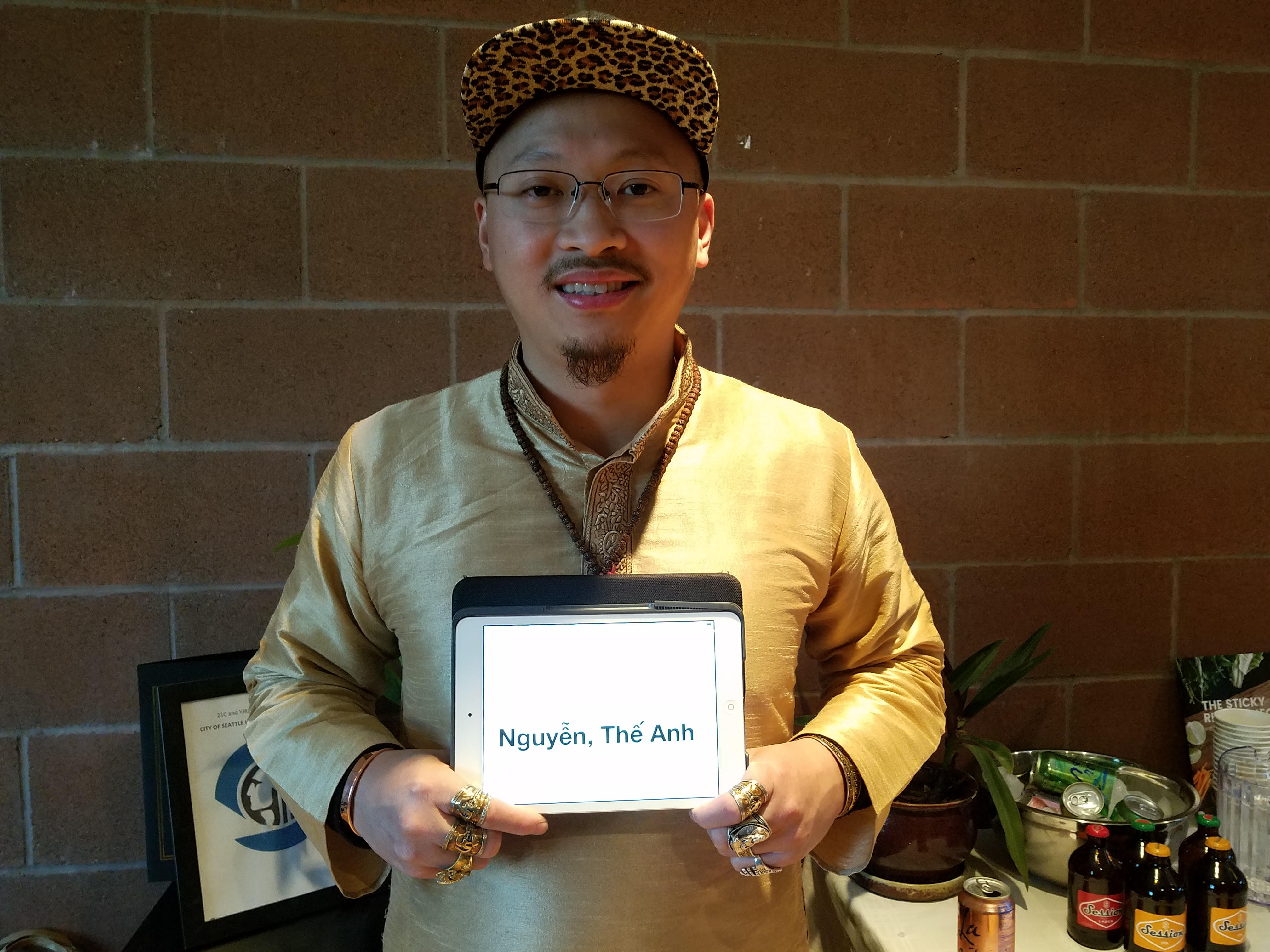
Nguyễn Thế Anh
My community coordinator called me into his office, and he said, “You will need to tell the patron not to write his name in Chinese characters, on our sign-in sheet!” I felt confused and upset. Inside, I was steaming, and thought, “Aren’t you Chinese, can’t you read the characters? Go tell that to the customer yourself, you are being rude.” Instead, I said, OK, and shared with the customer that our policy at the International District Chinatown Community Center requires that names are written in English. The Black man in his mid 30s in front of me wrote Wu De Long. He did not look very happy. It was a very uncomfortable moment between two strangers. The stranger and I later became friends. Wu De Long is someone who has a crazy past, and his closest Chinese friend was given a new name to start over. How could my boss, a Chinese American, ask someone to do such an insulting thing? Was it racism because he wanted the non-native Chinese to feel rejected? Later that day, I asked my boss how he came to write his name in English. According to him, when a Chinese person goes through immigration, they would speak their name and immigration officers spell it out phonetically.
In 1993, when my family arrived in Seattle through the Humanitarian program, my first white ESL teacher at Tops Elementary School wrote my name as “The-Anh.” I’ve been suffering for the past 34 years with people calling me The End, Duh Anh, and ThiAnh. For many years after our arrival, I gave up correcting people. I was satisfied with whatever they wanted to call me, as long as it was close enough. I was also known as Tee, Tay, and Tee Tee. Now, being older, I really wish I would have corrected everyone along the way, and make them pronounce my name the right way — to show me respect, instead of me being accommodating. It is painful not to be able to honor my namesake. My father chose a very nice name for me, but people butcher it. When I hear another Viet Namese person say my name, I feel satisfied and loved.
Decades after the Viet Nam War, Americans still cannot pronounce the last name “Nguyen” correctly.
For many of us, if they show some effort, it is good enough. Others have decided to give up and change to Anglo names, such as John and Cindy. As for the Viet Namese who are born here and barely speak the language, it’s a shame that they don’t take the time to learn it and share it with the world. My hope is this letter would inspire them to make a serious effort to pronounce their names the way it should be.
Two months ago, I finally had enough with the way my name has been written or published. For now, I will spare some people who can’t pronounce my name correctly, but soon that privilege will expire.
When my name is written without all the accent marks, it looks sterile, there is no acknowledgement or trace of my ancestors. I now write my name with all the accent marks, as if I am in Viet Nam. And I introduce myself as Nguyen, The Anh, in my Viet Namese accent — my last name first and followed by my first name. This is how we do it traditionally. So far, the experience has been mostly positive and people have shown me respect. One of the first people to acknowledge me as a Viet Namese person is my naturopathic doctor, a Muslim American, who has been married to a Viet Namese woman for 17 years.
He asked how to pronounce my name when he saw me write it down on a form. I felt joyous that day.
Standing up for ourselves and fighting to preserve our culture begins with educating people about who we are, and the proper way to write and say our names.
Sincerely,
— Nguyễn Thế Anh




Since this Article has published. North Seattle College has agreed to add language translation to their website. Hopefully, soon, we will have our names written correctly.
Thank you, Thế Anh.
I don’t feel so alone now. I have been writing my name the correct way with correct spelling for a few years now. I also accept how other Vietnamese Americans prefer to write their name.
Thank-You. I took this opportunity and recruited a number of leaders from our Viet Namese community to speak up. We just finished with North Seattle College Diversity and Inclusion Council. The Council will seek the State Education Board to see if they can accommodate future applicants. Next Step will lead us to Seattle Public School. This is a matter of Dignity, and it should be respected for all ethnic minority whom wishing to honor their names.